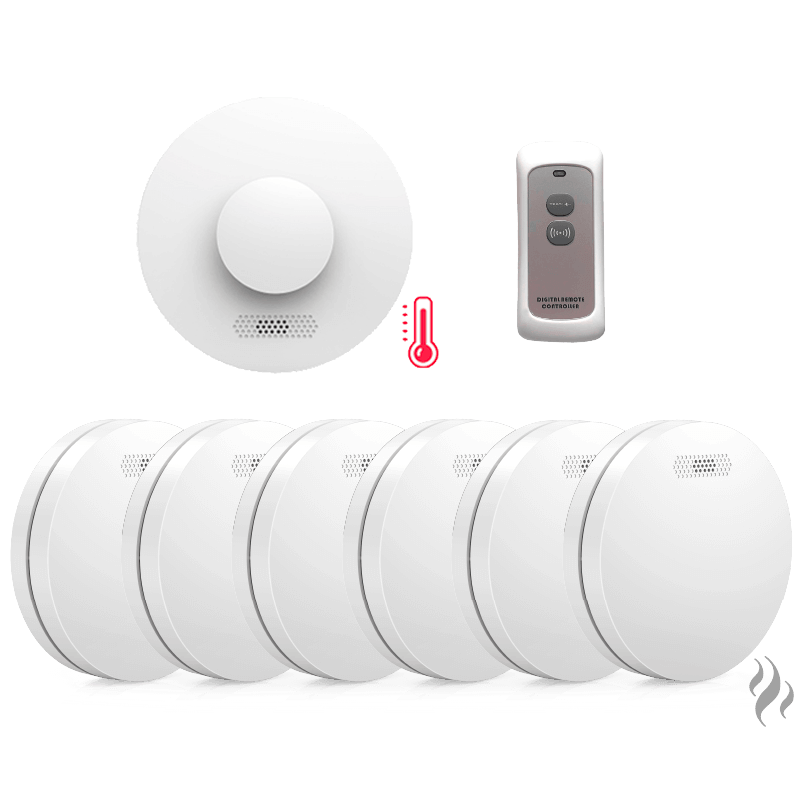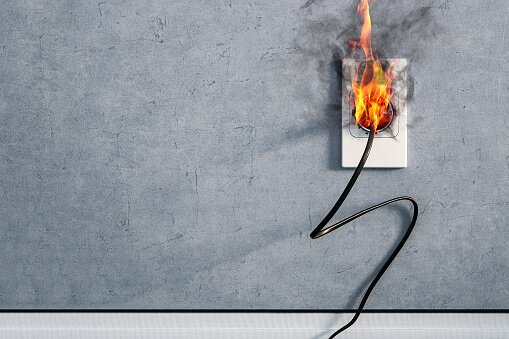
Fire can happen anywhere, anytime, and to anyone. That is why prevention is key to saving lives and property. Many people think that fire only happens in the wilderness or in places with no habitation. But in reality, home fires are most likely to occur. It's best to be familiar with some of the most common causes that result in fires. Here are some safety tips on how to prevent these safety hazards in your home.
Be Aware Of Candles And Flammable Liquids

Candles, curling irons and other flammable items should never be left unattended. If you are not in the room with them, make sure someone is there to watch them. If a fire does start from your candles or incense, try to put it out as soon as possible with water and baking soda, but if that doesn't work, get out as fast as possible and call the fire department.
Be sure to be careful about candles and any flammable liquids that are in your home, as they are some of the most common causes of fires. It's important for people to make sure that candles, hair styling tools, and other items aren't left unattended when they're not around because if they do start a fire, it could be difficult to put them out. The best way to put out a fire is by using baking soda and water but if those things don't work, it's best to get out of the house as quickly as possible and call the fire department as soon as possible.
In addition, flammable liquids such as lighter fluid and oil should never be stored in plastic containers (they are flammable). Keep flammable liquids away from open flames or sources of heat. Make sure that you don't store flammable liquids near the stove or furnace. If you have been using any of these things, think about storing them in a safer place until there is no longer a risk of fire. When not around, it's best to keep the containers closed and put them away where they can't be easily opened by a pet or small child.
Don't Leave Cooking Unattended
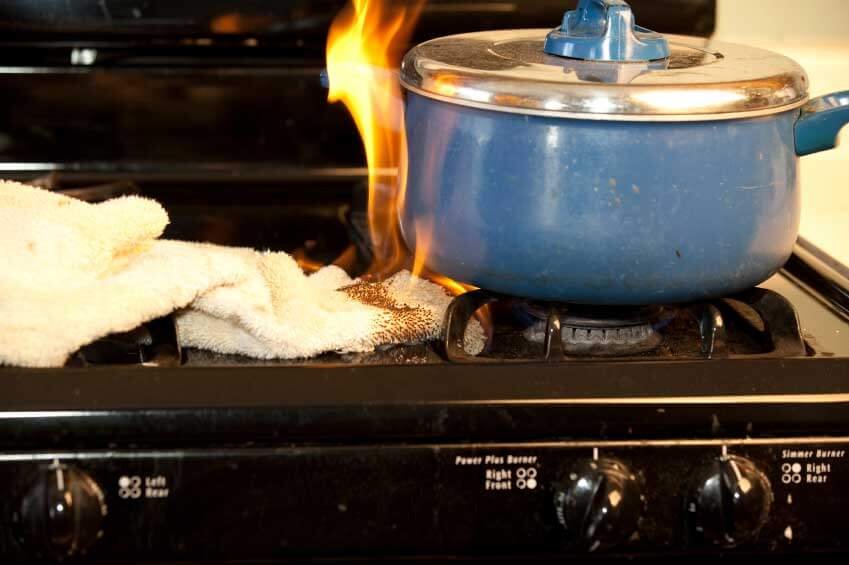
There are many dangers that come with cooking, and one such danger is the risk of leaving the cooking unattended. If you leave your cooking unattended for too long, some of the most common things that could happen are that it might catch something on fire or the food inside could become overcooked. Overcooked food can be dangerous to consume, and even result in death in some cases. The best way to prevent this is to keep an eye on the food while its cooking, especially if it starts to smoke.
If you smell smoke coming from your cooker or oven then take some action; turn off the stove and open all doors and windows in order to let air in. If there is still a fire after this, get everyone out of the house as soon as possible and call 999. The fire department will be able to put out any fires in the kitchen once they've arrived at the scene. Be sure to have a phone with you at all times when there's food cooking somewhere else in the house so that you can make any emergency calls quickly.
In particular, when cooking with oil, it's important not to put too much in the pan - otherwise it could overflow and catch something on fire. It's also a good idea to make sure you don't leave oil unattended on the stove when heating it up - this might cause it to boil over and catch something on fire. If this happens clean up any spills right away - they're very flammable!
Another way to prevent this from happening is by being sure that you're not using an appliance that is potentially dangerous on your stove or in a hot/open flame. For example, curling irons and other items that require an open flame should not be used on a stove or near an open flame at all. Additionally, giving your appliances a clean and checking the cord for damage is another great way to prevent fires related to cooking.
Never Leave Electric Heaters Unattended
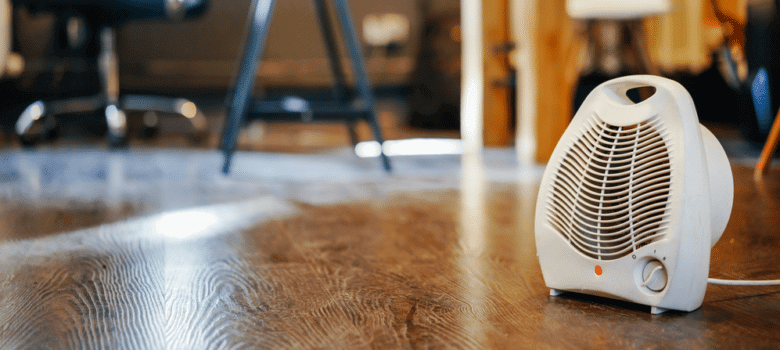
It's extremely important for you to be aware of the potential dangers that accompany electric heaters. These are not hard to operate, but they can be very dangerous if used incorrectly. Never leave an electric heater unattended. If you do, there's the risk that it could overheat and in some cases it could result in a fire.
Electric heaters work by using electricity to generate heat through a heating element. The heating element is typically located at the base of the device and heats up when powered on. This means that you should make sure that you don't use them in rooms where fumes, gas or other harmful things are present.
You should also not leave them on while you're sleeping and make sure that they aren't near any objects or flammable materials. If you have curtains nearby the heater then don't let it come in contact with them, otherwise they could catch fire. In addition to this, if the device starts to smoke it's best to turn off the switch straight away and open a window as well.
If you have children who can potentially hurt themselves by touching something that is hot or coming into contact with live wires/electrical wiring, make sure to keep them away from the heater at all times and unplug it when not in use - even when you're around!
You might not even realise that heaters are a fire hazard, but they can be. If you're not careful, an electric heater could easily start a fire in your home. To avoid an unnecessary fire risk, never leave the electric heaters unattended and follow the above tips!
Install Adequate Fire And Smoke Detectors In Your Home
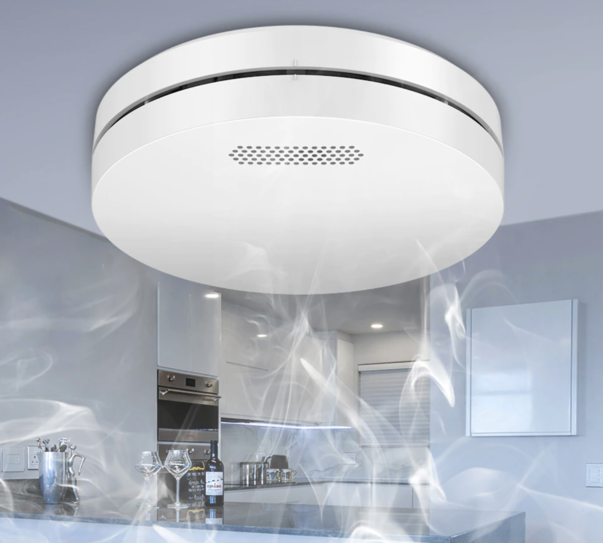
It's important for fire and smoke alarms to be installed in your home. You should make sure to have more than one alarm so that they can cover more ground. They should also be placed in easy-to-reach areas. The alarms shouldn't be obstructed by any furniture or cord covers, and you should periodically check them to make sure that they're working correctly.
The common life-span of a smoke alarm is around 3 years on average, so it's important to replace any that are past their prime. Additionally, you need to make sure that batteries are replaced before they run out of power. It can be very annoying taking care of the batteries all the time, but it is important to remember that a fire alarm can save your life when a fire is about to start.
If you're tired of changing the battery on your smoke alarm, then you might want to consider purchasing a 10-year battery powered smoke alarm. These will save you time and money for years, as they last 10 years before they get a replacement. Check your best options for interlinked smoke alarms now.
Which Fire Detectors Should You Install In Your Home?

Different areas of your home require different alarms, particularly those which are more likely to house fires. For example, the most common areas of your home should have adequate fire alarms fitted. While living rooms and bedrooms require smoke alarms, your kitchen requires a heat alarm alongside with carbon monoxide detectors.
The importance of installing the right fire alarms across your home is to avoid false triggers, and to fully protect your home. If you don't want to fit fire alarms because they always go off without reason while cooking, then you should have a look at our article here.
If you are familiar with smoke alarms, heat alarms and carbon monoxide detectors, but not sure in which areas these should be fitted, read our full guide on where to install your fire detectors. Installing fire and smoke alarms is easier and cheaper than ever, discover how!
Keep Children Away From Dangerous Sources Of Fire

Keeping children away from any source of fire is an important task to undertake because it could result in a disaster. It's very easy for a child to get injured by touching something that's hot or coming into contact with live wires/electrical wiring. To avoid this, you should make sure that you unplug the device when not in use and keep children away from it as well. If you have an item that requires an open flame and a switch to turn it on/off, such as curling irons or hair straighteners, don't let your children use them.
If you're going to be cooking with oil, make sure to keep the pot away from places where your kids might reach it because oil has a very high temperature in comparison to the skin of a child which could result in their getting burned. You can also put something down underneath the oil so that if there's any spillage it won't end up all over your floor and potentially cause a fire.
Make sure that young children and properly trained and instructed on how to use the things that are in your home. If there is a young child who doesn't know how to use something properly, they might not be able to put out an accidental fire before it gets too big or destroy the thing completely.
Finally, instruct your children on how to behave in case of emergency if there is a fire nearby - call an adult or dial 999. If they are too young, make sure to have a phone number with them or near that should be dialled in case of emergency.
Be Prepared For Fires
It's hard to prepare for anything, but there are things that can be done to ensure that your home is as fire-safe as possible. From having the right kind of alarms in the right spots in your home to staying away from behaviours and items that have been known to cause fires, it's important that you plan ahead and organise a safety plan today.
"It doesn't happen that often, it never happened in this neighbourhood, it never happened to anyone of my friends, it will never happen in this house, ...". If you ever heard yourself saying these kind of things to yourself, then you might want to rethink this position. Here are some guidance on how to react to a home fire, in case this happens in your house.
Keep A Fire Extinguisher In The Kitchen

In the kitchen, one of the most common sources of fire is from cooking. If you leave oil or grease unattended, it could potentially catch fire and burn your house down. A basic fire extinguisher can be enough to put out a small grease fire - just aim the nozzle at the base of the flames and turn it on.
You may have one in the garage, but fire extinguishers come in different sizes and depending on the size of your kitchen you might need a smaller version. There are some models that can be mounted to your wall or put under the sink which means less clutter and more safety.
A fire extinguisher is a relatively inexpensive and effective way to help protect your property against fire damage. Although they're not a guarantee against having a fire in your home, they can help you put out small fires quickly. Fire extinguishers are the easiest and most effective way to keep your house safe from fire damage before it happens, and should be an integral part of any property safety plan.
Test Your Fire Alarms On Regular Basis
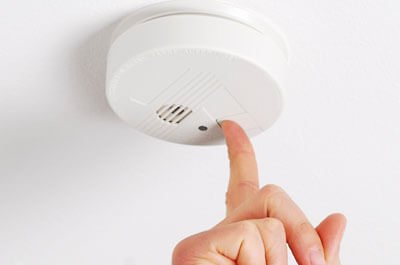
Another important part of any fire safety plan is to regularly test your smoke alarms and carbon monoxide detectors. Fire hazards vary from place-to-place and it's possible that you might have more at home than the average person, so this should be done on a weekly basis. It's advisable to check all the different spots in your home for smoke alarms and carbon monoxide detectors, as well as making sure that they're all working properly.
If you have a hard time remembering when to check your alarms, keep an alarm clock at your bedside or in the kitchen so that it's easy to see what time of the day it is and remember to go through on these regular checks.
A lot of people might say that they don't need a fire alarm system because their smoke alarms are on the ceiling, but this isn't enough - you should have these in every room for optimal safety. You can even add additional detectors around your home if you think it's necessary. Check out which fire detectors your home might require.
Always Have A Plan "B"
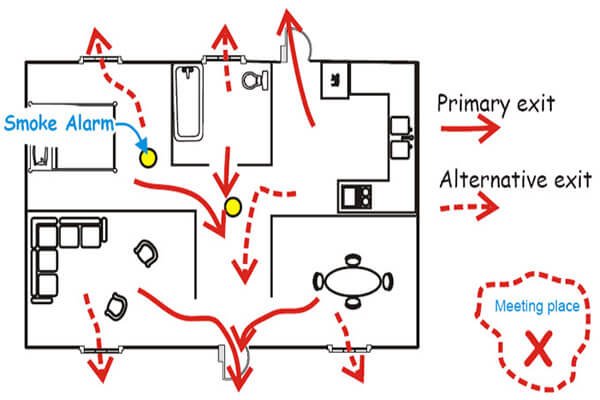
The most important thing is to never let yourself be trapped in a fire. Make sure the escape routes are clear of anything flammable and that there's nothing (like furniture or decorations) blocking them.
Always keep in mind where your emergency exits are, and make sure that everyone in the household knows them. Practice an escape plan regularly so that it becomes second nature - if there's a fire, you want everybody to be able to get out as quickly as possible.
Go against what many people think (don't go towards the flames) and get out of the house as quickly as possible. Once you're outside, make sure that everyone stays together to ensure nobody gets lost in the panic. Stay away from the fire so you don't put yourself or your family in additional danger - stay calm and alert and make sure that everybody is okay.
Having a plan gives you peace of mind - it will help you sleep better at night and ensures that you're not caught off guard in case something bad happens. A little time spent now can mean the difference between a house that only suffered minor fire damage and one that's been destroyed.
Prevention Is Key
It is no doubt that risk of fire can be a major contributor to the loss of property, so it's wise to prevent fires from starting in the first place. It will require some time and effort but you can start simple by checking your smoke alarms regularly and double-check that they're working correctly. You may also want to consider additional detectors around your home and having a fire extinguishing kit in place so that you can quickly put out any fires before they spread.
The best thing to do is to make a safety plan with the people who also live in the property - think of everything including emergency exits, places where smoke could gather and putting out small fires. So next time when you hear a fire alarm go off, don't panic - make sure your family is safe and that everyone is out of the house before you call the emergency services.
Remember, prevention is key - you want to do everything in your power to keep your family safe.

